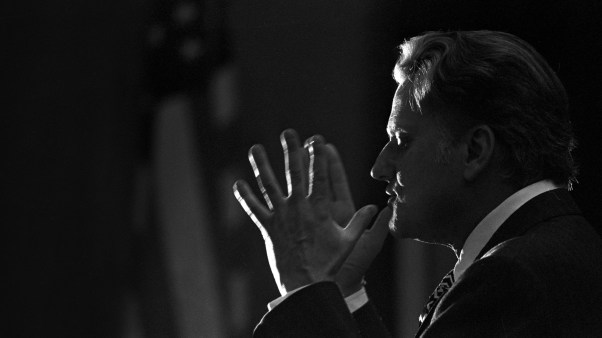Last month I attended a “worship experience” that included smoke machines, lasers, digital graphic projections, and more flat panel screens than I could count. Technology is changing the way we worship, but what are we losing as a result? David Fitch, pastor of Life on the Vine Christian Community in Long Grove, Illinois, and author of The Great Giveaway (Baker, 2006), encourages us to use greater discernment when employing technology in worship.
I read a nice story recently about football player Jerome Bettis (aka “the Bus”) returning home to Detroit for the Super Bowl. They described his whole journey and how he bought a house for his parents on a golf course in suburban Detroit. But he didn’t stop there. Johnie Bettis, the running back’s mother, recalls: “When Jerome found out we were going to the laundromat, he said that wasn’t acceptable and told us to go get a new washer and dryer. But I kind of liked the laundromat because you get to meet so many interesting people.”
Mrs. Bettis’ comments reminded me how technology can change the inherent “good” of the basic practices of our lives. Technology, in this case a washer and dryer, means no longer needing to go to the laundromat. As a result, we lose the “good” of meeting and engaging interesting people in our lives. We must therefore discern whether more technology (buying a washer and a dryer, a cell phone, or Tivo) is a good idea by considering more than just the capitalist reasons: “it’s more efficient,” “it saves time,” or “it just looks and feels so good.”
The same of course is true of worship. Not every technologically enhanced “improvement” necessarily improves our worship. The flashing of the Lord’s Prayer on the screen with a powerful graphic may disable us from bowing as a community and saying it from our soul’s memory – in submission together as a Body of Christ.
The brilliant Albert Borgmann in his book Power Failure, narrates for us how technology can change something that was once a “commanding reality” with deep personal and corporate value, and turn it into a “disposable reality” devoid of meaning and power. For example, the music symphony that took so much time, effort, tuning up of instruments, the staging of a concert hall . . . is now reduced to a handy CD that we can play at our convenience and command. He believes this shift to a disposable reality changes us and how we view our world.
Borgmann says technology can make certain wonderful “goods” in our lives disappear without us even knowing it. Example: the central fireplace is replaced by the invisible central air furnace. In the process the family that once gathered around the fireplace to get warm before heading off to bed no longer engages in the community-building routine. The family no longer talks about the day, tells stories, or prays together. Through technology we lose what Borgman calls a “focal practice.” We lose a concrete, formative, and simple activity, and our lives are changed without ever noticing.
The question is obvious. Have we lost worship as a focal practice? By turning it into an “experience” saturated with convenient technology, have we made worship a disposable reality when in it is supposed to be a commanding reality?
Last night at a worship meeting we talked at length about the use of technology and graphic arts in our worship service this past Sunday. We want to retain the concrete nature and the formative practice of art in our church, but any art that shocks or produces a disposable experience we try to avoid. Art is really important in our church, but we must not produce disposable experiences. We must retain the focal practice of worship.
Focal practices and commanding realities are things we lose when we purchase a washer and dryer. These are things we lose when we turn worship into a theater show for the masses. And so we must be careful with the application of technology in worship. I am not saying don’t use it! I am saying let us be discerning. I believe we need the candles, the wonder, and the mystery of the concrete embodiment of Christ’s work at the Lord’s Table. We need to kneel (if our knees will hold out) before God with all our brokenness. And we need to use the marvelous technologies of our day in worship in ways that resist making God, community, and worship disposable.
David Fitch is pastor of Life on the Vine Christian Community in Long Grove, Illinois, a professor of ministry, theology, and ethics at Northern Seminary, and author of The Great Giveaway: Reclaiming the Mission of the Church from Big Business, Parachurch Organizations, Psychotherapy, Consumer Capitalism, and Other Modern Maladies (Baker 2006).








